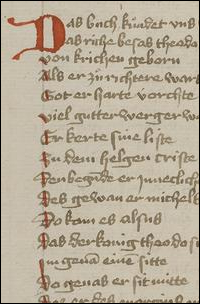Kaiserchronik – digital

The "Kaiserchronik" is an early Middle High German verse chronicle written around the middle of the 12th century, presumably in Regensburg by an unknown cleric. With over 17,000 verses, the chronicle is the most extensive and, with 50 known textual witnesses to date, the most densely preserved work of early Middle High German literature. It tells the story of the Roman Empire from Gaius Julius Caesar († 44 BC) to king Conrad III († 1152).
The text has survived in different versions: There are three recensions of the verse version (A to C) and a prose version (D). In addition, individual episodes of the text are also handed down detached from the larger textual context (E). Of the three verse versions, version A is the oldest. Version B is a first adaptation from the beginning of the 13th century from the Bavarian-Austrian region, which shortens the text by about 1,600 verses. Version C is the second adaptation, written after 1250, which adds a new prologue and also continues the text into the year 1250. It was probably also written in Regensburg.
In the five-year "Kaiserchronik Project" at the University of Cambridge, led by Prof. Christopher Young and Dr. Mark Chinca, the three recensions (A to C) of the "Kaiserchronik" will be edited, annotated and translated.
Within the framework of the research project, the entire tradition (currently 50 manuscripts from the 12th-16th centuries are known) will be recorded, analysed and - if possible - brought together in a virtual library. The project will also result in a three-volume scholarly printed edition and a one-volume study edition.
Two of the manuscripts (Cod. Pal. germ 154, Cod. Pal. germ 361), both of which belong to the transmission group of recension A ("the old text"), are part of the Bibliotheca Palatina and are kept at Heidelberg University Library.
In the cooperation project, Heidelberg University Library is responsible for setting up the virtual library and presenting the digital edition.

